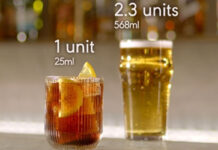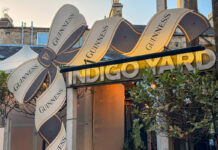Firms suggest publicans push premium hard
With cocktail culture now firmly established as a force for good margins in the on-trade and sub-category booms like that experienced by craft gin showing no sign of abating, there’s never been a better time to stock premium spirits.
That’s the view of a number of firms supplying spirits to the Scottish on-trade, who said there are several ways operators can make the most of customers’ ongoing love affair with all things premium.

Jonathan Gillbanks, UK sales director for the on-trade at Whyte & Mackay, said the spirits category is “hugely diverse” with spirits from across the globe “offering a huge breadth of flavour profiles and a variety of serves”.
“This diversity helps spirits to appeal to a broad consumer base while offering a wide range of choices – great for customers who are becoming more adventurous, with a third saying they enjoy exploring new alcoholic drinks,” said Gillbanks.
With increasing competition for discretionary spending, Gillbanks said it “pays to be innovative” with premium spirits, and suggested operators explore “more creative serves”.
“20% more outlets are selling cocktails year on year, so their popularity isn’t going away – and that’s something the on-trade can tap into,” said Gillbanks.
 “We recommend investing in spirits that taste great both on their own, and in a range of summery cocktails.”
“We recommend investing in spirits that taste great both on their own, and in a range of summery cocktails.”
A spokeswoman for Halewood Wines & Spirits, the firm behind Liverpool Rum and Whitley Neill gin, agreed that the on-trade is in a prime position to capitalise on the popularity of premium spirits.
“We continue to see a greater demand for premium spirits as consumers turn away from the mass market in search of accessible, high-quality alternatives,” she said.
“The category is meeting this demand with products of craftsmanship and rich provenance.”
One of the main benefits of premium spirits is their ability to provide a point of difference for a venue, according to Halewood, with the firm’s spokeswoman suggesting bar staff can play a large role in creating a buzz around an outlet’s offer.
“We are definitely seeing a change in the way consumers are viewing spirits and cocktails – by interacting more with bartenders, becoming more educated and sharing ideas,” she said.
Dan Bolton, managing director of Hi-Spirits, the firm behind Southern Comfort and Brooklyn Gin, agreed that staff engagement “can make all the difference” when it comes to premium spirits sales.
“If staff know the key facts about a premium spirits brand in terms of provenance and flavour, as well as being able to make the signature serve, they can upsell to customers,” he said.
Taking a similar stance, Chris Molyneaux, master distiller and founder of Daffy’s Gin, commented that staff training is “key”. He said that operators should “capitalise on high quality training such as that offered by brands”, adding that this can boost staff confidence – and therefore boost sales.
“The more staff feel comfortable talking about premium spirits, the easier it is to share the information with customers and upsell,” he said.
Beyond product knowledge, one area where staff can make a big difference on the quality of a drink is in its presentation, which Bolton reckons can be a big help to operators looking to boost margins.
“Great presentation not only helps operators command a premium price, it encourages further sales,” said Bolton.
“Customers enjoying long drinks served with plenty of ice and fruit garnish, especially from point of sale such as branded mugs and mason jars, are selling your drinks offer to the next thirsty customer who walks in.”
In the age of social media, great presentation doesn’t need to stay in the bar area, either, and Bolton reckons it’s not too hard to have customers shouting about an outlet online, which can help to drive footfall.
“Customers don’t need too much persuasion to post a picture of their drink online,” said Bolton.
“Great presentation in terms of glassware and garnish will ensure social media is a shop window for the business, and displaying social media hashtags and handles on chalkboards and menus helps make it simple.”
We are definitely seeing a change in the way consumers are viewing spirits and cocktails.
Presentation on the menu was also flagged by Rob Poulter, on-trade consultant at Diageo, who reckons a well set-out cocktail list can drive premium spirit sales.
For starters, Poulter suggested operators list the premium spirits used in their cocktails on the ingredients menu.
“Over half of adult consumers think it is important that the brands are listed in the ingredients menu, so outlets need to make it clear when creating their menu,” he said.
Poulter added that to fully maximise the sales opportunity provided by premium spirits, operators should strike a balance on their cocktail menu between traditional favourites and more innovative serves.
“Offer choice – accommodate customers who actively seek new and innovative cocktails and those who stick to their favourite cocktails by ensuring your menu offers the traditional favourites as well as unique and alternative options – for example ‘herbs’ and ‘savoury’ trends are taking off,” he said.























